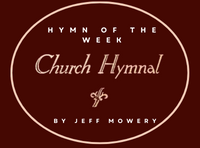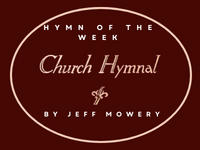Such Love
That God should love a sinner such as I
Should yearn to change my sorrow into bliss
Nor rest till He had planned to bring me nigh
How wonderful is love like this?
CHORUS
Such love, such wondrous love
Such love, such wondrous love
That God should love a sinner such as I
How wonderful is love like this.
That Christ should join so freely in the scheme
Although it meant His death on Calvary
Did ever human tongue find nobler theme
Than love divine that ransomed me?
That for a willful outcast such as I
The Father planned, the Saviour bled and died
Redemption for a worthless slave to buy
Who long had law and grace defied.
And now He takes me to His heart a son
He asks me not to fill a servant’s place
The “Far-off country” wand’rings all are done
Wide open are His arms of grace.
I found the words to this particular hymn in a 70+ year old hymnal I have at home. I did have some difficulty finding it online to cut and paste the lyrics. Google just isn’t what it used to be. Since we are drawing close to Valentine’s Day, I thought it might be a good idea for all of us to be reminded of true love. We are bombarded in our culture with various definitions and interpretations of love. Most are incomplete reflections of God’s true love. Many examples don’t even qualify to be called love because they are so shallow, temporary, and meaningless. This hymn, however, reminds of a great love – a love truly worth celebrating.
In searching for this hymn online, I came across one of those “unpardonable sins” regarding hymns – the changing of an author’s lyrics. Think about it. We don’t change “Romeo, Romeo, wherefore art thou Romeo?” We don’t re-word “Et tu Brute” to make it more understandable. We take Shakespeare’s words (however old or hard to read they are), and we spend some time trying to understand what he meant, but we leave them as he wrote them. This is one of my personal pet peeves that I have regarding hymn lyrics. I sometimes see lyrics from old hymns changed or “modernized.” When I see this, I ask myself – was the lyric changed because it was theologically incorrect? Was the lyric changed to make it clearer for the reader? Or was the original lyric changed because it made someone a little uncomfortable? What was the purpose of the change?
The line that was changed in this particular hymn is found in verse two where it refers to Christ joining in the “scheme.” The alternative versions do not refer to it as a scheme. I will admit that when I first read this line, I too thought “That’s not what it was – it wasn’t a scheme!” But then, if you dig into the world “scheme” a little bit, there are some alternative meanings. How about the word “plan?” We don’t have a problem with that language. God had a plan from the foundation of the world to redeem mankind. When the Old Testament sacrificial system was put in place, God planned for it to be a foreshadowing of what Christ would do for us on the Cross. How about “orchestrate?” An orchestra is a combination of a variety of instruments put together to make beautiful music. The tuba might not be beautiful on its own (no offense to any tuba players), but it is an essential part of an orchestra. God used common men. God used Creation. God used wicked kings like Herod to ultimately bring His plan into place. God “orchestrated” His plan of redemption that Christ should be born “when the fullness of time had come.” Although “scheme” may have negative connotations today, aren’t you encouraged that God so loved mankind that He would go to great lengths to plan and orchestrate our redemption?
One other comment on the lyrics. In the last verse, it refers to “Far country” wanderings. This is a subtle reference to the story of the Prodigal Son found in Luke 15. Here’s the Scripture reference, “And not many days after the younger son gathered all together, and took his journey into a far country, and there wasted his substance with riotous living.” Luke 15:13 KJV. This is one of those Bible stories that I love to hear, but wish I could remember the first time I heard the story. I wonder if the first time I heard it if my anger burned against the son. I probably wanted to ask the son “How can you be so selfish to (a) ask for your inheritance early, (b) waste it on riotous living, (c) and then dare to show your face and come home?” I am sure I thought that he was going to get what he deserved in the end. I was probably more like the other brother in the story (and am unfortunately too much like him today). I think I would have been mad, and forgiveness was probably far from my mind. However, the Father was not like that, and thankfully God is not like that with us. We were the Prodigal. In many ways, we wasted what God gave us, and defiled His name by “riotous living.” But His grace and love were so great that He forgave us and welcomed us home.
“Such” – Do you use that word anymore? It seems that it is one of those words that may be dying in the English language. The only phrase I could think of where “such” is used regularly anymore is “There’s no such thing.” For those that don’t know Christ, that might be their reaction to the description of love found in this hymn. A love that would cost God everything – His only son. A love for people who willingly, continually, frequently, and openly sin and transgress His law. A love for people that, as the author states, are “worthless slaves.” Regarding that kind of love, those people might say “There’s no such thing.”
However, for those of us that have accepted His gift of grace, we know that there is “such” a thing. A love that forgave our sin. A love that wrapped His arms around us and called us His own. A love that is amazing. I hope that our testimony (in a world filled with all kinds of “so-called” love) is there is “such a love” as this. But that there is only one place to find it. You won’t find it in a box of chocolates, a dozen roses, or in a velvet jewelry box. There is only one “such” place to find it – in Jesus Christ alone.

